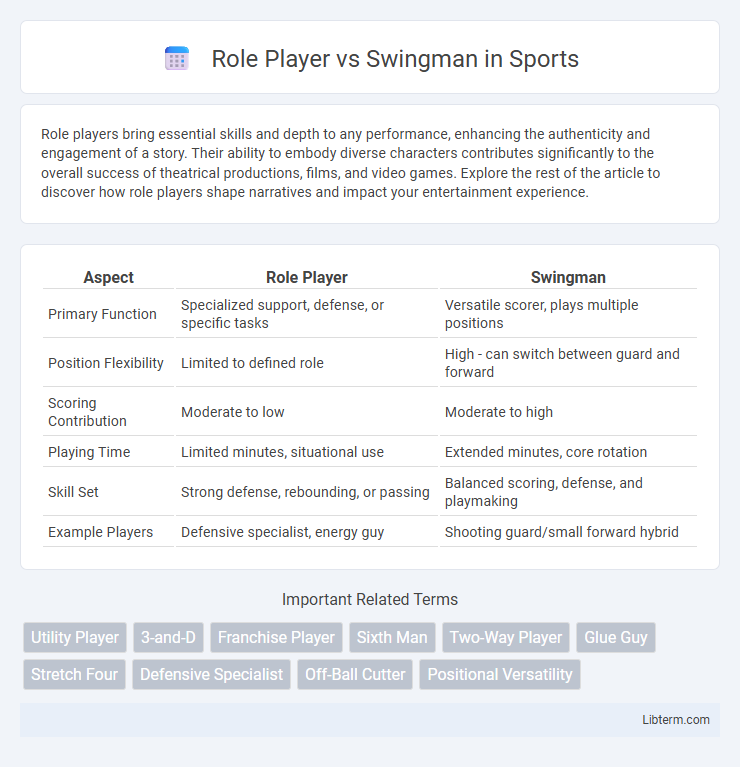Role players bring essential skills and depth to any performance, enhancing the authenticity and engagement of a story. Their ability to embody diverse characters contributes significantly to the overall success of theatrical productions, films, and video games. Explore the rest of the article to discover how role players shape narratives and impact your entertainment experience.
Table of Comparison
| Aspect | Role Player | Swingman |
|---|---|---|
| Primary Function | Specialized support, defense, or specific tasks | Versatile scorer, plays multiple positions |
| Position Flexibility | Limited to defined role | High - can switch between guard and forward |
| Scoring Contribution | Moderate to low | Moderate to high |
| Playing Time | Limited minutes, situational use | Extended minutes, core rotation |
| Skill Set | Strong defense, rebounding, or passing | Balanced scoring, defense, and playmaking |
| Example Players | Defensive specialist, energy guy | Shooting guard/small forward hybrid |
Defining Role Player and Swingman in Basketball
A role player in basketball specializes in specific tasks like defense, rebounding, or perimeter shooting, often supporting the team's star players without dominating the game. A swingman is a versatile player who can effectively perform both shooting guard and small forward roles, contributing to scoring, defense, and playmaking. The key difference lies in the swingman's broader skill set and ability to switch between positions, whereas a role player excels in situational contributions within their defined role.
Key Characteristics of a Role Player
A Role Player excels in specialized skills, often focusing on defense, rebounding, or specific offensive tasks that support the team's core strategy. Unlike a Swingman, who plays multiple positions with scoring versatility and agility, a Role Player thrives by optimizing efficiency within a narrow, well-defined role. Their value is measured through consistency, situational awareness, and the ability to execute assigned responsibilities with minimal error.
Essential Qualities of a Swingman
A swingman in basketball must exhibit versatility, seamlessly transitioning between shooting guard and small forward positions with strong defensive skills and scoring ability. Essential qualities include agility, reliable perimeter shooting, and the capacity to guard multiple positions effectively. Their adaptability and high basketball IQ enable them to exploit mismatches and contribute significantly on both ends of the floor.
Impact on Team Dynamics: Role Player vs Swingman
Role players provide specialized skills that enhance team cohesion by fulfilling specific roles consistently, creating stability in both offense and defense. Swingmen bring versatile positional flexibility, allowing coaches to adapt strategies dynamically and respond to opponents' tactics in real time. The integration of role players and swingmen shapes a balanced team dynamic, optimizing performance through complementary strengths.
Offensive Contributions: Specialist vs Versatile
Role players excel as offensive specialists, consistently delivering high-percentage shots and fulfilling specific scoring roles within a team's offensive scheme. Swingmen contribute versatile offensive skills, capable of initiating plays, driving to the basket, and hitting perimeter shots, thus providing multifaceted scoring options. The offensive value of role players lies in their efficiency and reliability, while swingmen add unpredictability and adaptability on the scoring front.
Defensive Responsibilities: Limitation or Flexibility
Role players often face limitations in defensive responsibilities, assigned specific matchups to minimize opponent scoring, allowing no room for flexibility. Swingmen possess greater defensive versatility, capable of guarding multiple positions due to their combined size, speed, and agility. This flexibility enables coaches to adapt defensive schemes dynamically, exploiting mismatches and improving overall team defense.
Evolution of the Swingman Role in Modern Basketball
The swingman role in modern basketball has evolved from a traditional role player to a versatile scorer who can guard multiple positions and contribute dynamically on offense and defense. Advanced metrics highlight swingmen's importance in spacing the floor and enhancing team pace with perimeter shooting and athletic drives. As NBA now prioritizes positionless basketball, swingmen are crucial for tactical flexibility, blending the size of a forward with the skills of a guard.
Notable Role Players and Famous Swingmen in NBA History
Notable role players like Robert Horry and Andre Iguodala have been crucial in NBA championships due to their versatile defense and clutch shooting. Famous swingmen such as Scottie Pippen and Paul George excelled at both shooting guard and small forward positions, blending scoring ability with defensive prowess. These players revolutionized team dynamics by offering flexibility and reliability on both ends of the court, shaping modern basketball strategies.
How Coaches Utilize Role Players and Swingmen
Coaches utilize role players primarily to execute specialized tasks such as defense, spot-up shooting, or rebounding, enabling them to maintain team balance and consistency. Swingmen, capable of playing both shooting guard and small forward positions, offer versatility that allows coaches to adapt lineups dynamically based on matchups and game flow. This strategic deployment maximizes roster flexibility, optimizing both offensive spacing and defensive assignments.
Future Trends: Blurring Lines Between Roles
The evolving dynamics of basketball see role players and swingmen increasingly sharing responsibilities, with future trends emphasizing versatility and adaptability on the court. Advanced analytics drive this shift by identifying players who seamlessly transition between guard and forward positions, maximizing lineup flexibility and strategic depth. Teams invest in developing hybrid skill sets, blending defensive tenacity of role players with the scoring ability of swingmen to meet the demands of fast-paced, positionless basketball.
Role Player Infographic

 libterm.com
libterm.com